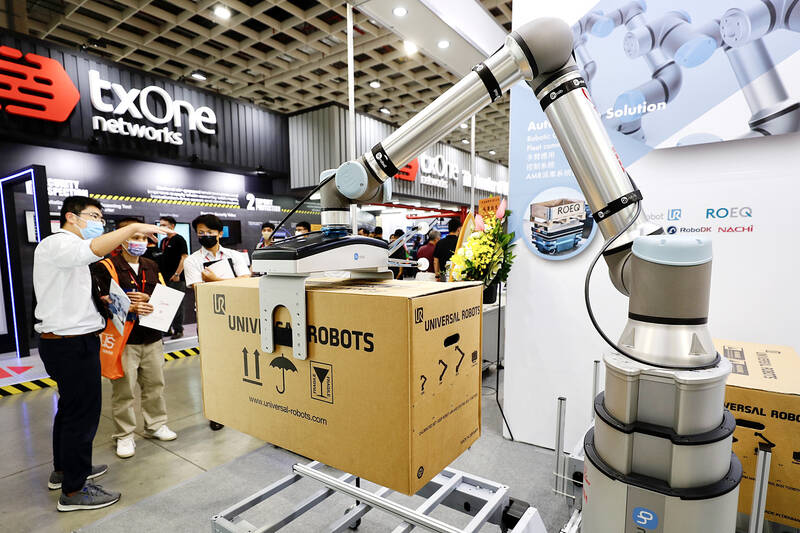Intelligent Asia, one of the largest industrial procurement platforms in the region, opened in Taipei yesterday, featuring automation and robotics, along with a wide range of other technologies.
Roughly 1,200 exhibitors at about 4,000 booths are displaying technologies in the fields of logistics, cold chain, 3D printing, molds and dies, lasers, fluid power and smart machinery.
The event is to run until Saturday at the Taipei Nangang Exhibition Center’s Halls 1 and 2.

Photo: RITCHIE B. TONGO, EPA-EFE
Taiwanese, German, Japanese and Swiss firms are showcasing automation and robotics technologies, featuring industrial computers, industrial control systems, robotic arms, automation software, measuring and inspection equipment, automated guided devices, processing tools, and artificial intelligence applications, the event’s organizers said.
President Tsai Ing-wen (蔡英文) told the opening ceremony that Taiwan aims to partner with regional economies in the development of smart manufacturing, at a time when global supply chains are being restructured and business opportunities in digital transformation are emerging as a result of the COVID-19 pandemic.
Her administration has prioritized the development of smart machinery and it continues to offer incentives for Taiwanese investors in that field to return home, she said.
Taiwan is looking to integrate its hardware and software expertise at this critical time for the development of smart manufacturing, Tsai said, noting the nation’s ranking in this year’s World Competitiveness Yearbook.
Taiwan moved up one spot from last year to seventh place and maintained its ranking as the third-most competitive economy in Asia in the yearbook compiled by the International Institute for Management Development.
With a ministry of digital affairs set to be inaugurated tomorrow, Taiwan is poised to accelerate its digital transformation and build a digital economy, Tsai said.
One of Taiwan’s major goals is to achieve net-zero emissions by 2050 and the government would invest NT$900 billion (US$29.73 billion) over the next eight years, she said.
Advantech Co Ltd (研華), the world’s biggest industrial PC maker, said at the event that it would, with its counterparts such as Smasoft Technology Co (偲倢科技), Hiti Industrial Automation Co (誠睿自動化), eAI Technology Inc (漢門科技), Prowave Engineering Inc (譜威科技) and Servtech Co (科智企業), push for green industrial transformation.

Leading Taiwanese bicycle brands Giant Manufacturing Co (巨大機械) and Merida Industry Co (美利達工業) on Sunday said that they have adopted measures to mitigate the impact of the tariff policies of US President Donald Trump’s administration. The US announced at the beginning of this month that it would impose a 20 percent tariff on imported goods made in Taiwan, effective on Thursday last week. The tariff would be added to other pre-existing most-favored-nation duties and industry-specific trade remedy levy, which would bring the overall tariff on Taiwan-made bicycles to between 25.5 percent and 31 percent. However, Giant did not seem too perturbed by the

Foxconn Technology Co (鴻準精密), a metal casing supplier owned by Hon Hai Precision Industry Co (鴻海精密), yesterday announced plans to invest US$1 billion in the US over the next decade as part of its business transformation strategy. The Apple Inc supplier said in a statement that its board approved the investment on Thursday, as part of a transformation strategy focused on precision mold development, smart manufacturing, robotics and advanced automation. The strategy would have a strong emphasis on artificial intelligence (AI), the company added. The company said it aims to build a flexible, intelligent production ecosystem to boost competitiveness and sustainability. Foxconn

TARIFF CONCERNS: Semiconductor suppliers are tempering expectations for the traditionally strong third quarter, citing US tariff uncertainty and a stronger NT dollar Several Taiwanese semiconductor suppliers are taking a cautious view of the third quarter — typically a peak season for the industry — citing uncertainty over US tariffs and the stronger New Taiwan dollar. Smartphone chip designer MediaTek Inc (聯發科技) said that customers accelerated orders in the first half of the year to avoid potential tariffs threatened by US President Donald Trump’s administration. As a result, it anticipates weaker-than-usual peak-season demand in the third quarter. The US tariff plan, announced on April 2, initially proposed a 32 percent duty on Taiwanese goods. Its implementation was postponed by 90 days to July 9, then

AI SERVER DEMAND: ‘Overall industry demand continues to outpace supply and we are expanding capacity to meet it,’ the company’s chief executive officer said Hon Hai Precision Industry Co (鴻海精密) yesterday reported that net profit last quarter rose 27 percent from the same quarter last year on the back of demand for cloud services and high-performance computing products. Net profit surged to NT$44.36 billion (US$1.48 billion) from NT$35.04 billion a year earlier. On a quarterly basis, net profit grew 5 percent from NT$42.1 billion. Earnings per share expanded to NT$3.19 from NT$2.53 a year earlier and NT$3.03 in the first quarter. However, a sharp appreciation of the New Taiwan dollar since early May has weighed on the company’s performance, Hon Hai chief financial officer David Huang (黃德才)